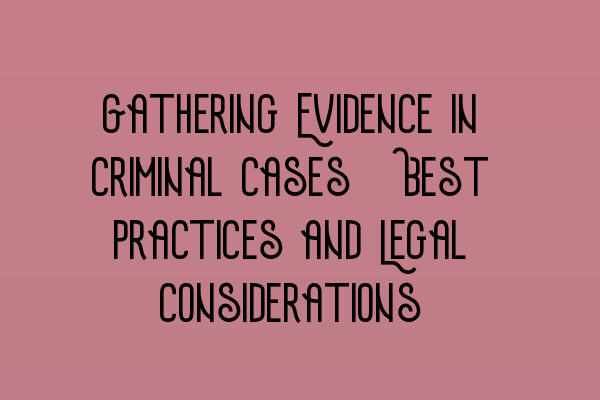Gathering Evidence in Criminal Cases: Best Practices and Legal Considerations
Welcome to the SQE Criminal Law & Practice Law UK blog. In this article, we will discuss the best practices and legal considerations when it comes to gathering evidence in criminal cases. As solicitors, it is crucial to understand the importance of gathering strong and admissible evidence to build a strong defense or prosecution.
The Importance of Gathering Evidence
Effective evidence gathering is the cornerstone of a successful criminal case. It provides the necessary foundation upon which legal arguments can be built. Gathering evidence early in the investigative process allows solicitors to gather all relevant information, identify strengths and weaknesses, and develop a sound legal strategy.
One of the key aspects of evidence gathering is conducting thorough witness interviews. Witnesses can provide crucial information that can make or break a case. It is essential to ask the right questions and to ensure that witness statements are accurately recorded and signed.
Best Practices in Evidence Collection
When it comes to collecting evidence, solicitors must follow best practices to ensure its admissibility in court. Some of the best practices include:
- Preserving the Chain of Custody: It is essential to maintain a proper chain of custody for all collected evidence. This includes carefully documenting the collection, storage, and transportation of evidence to prevent any tampering or contamination.
- Using Technological Tools: Technology plays a significant role in evidence gathering. Utilizing forensic tools, surveillance cameras, and digital evidence analysis can uncover critical information for a case.
- Collaborating with Experts: Seeking the assistance of expert witnesses or investigators can significantly enhance the credibility of the evidence. Their specialized knowledge can provide valuable insights that may potentially turn the tide in a case.
Legal Considerations
While gathering evidence, solicitors must also consider the legal framework within which they are operating. It is essential to adhere to the following legal considerations:
- Lawful and Ethical Practices: Solicitors must ensure that evidence is gathered lawfully and ethically. This means obtaining necessary permissions, respecting privacy rights, and using acceptable investigatory techniques.
- Admissibility in Court: Solicitors must be aware of the legal requirements for evidence to be admissible in court. Failure to comply with these requirements can render evidence inadmissible, potentially weakening the case.
- Proper Documentation: Keeping accurate and detailed records of evidence collection and preservation is crucial. This documentation helps establish a clear chain of custody and provides transparency in the investigative process.
Conclusion
Gathering evidence in criminal cases is a complex and critical task. By following best practices and considering the legal framework, solicitors can ensure the strength and admissibility of the evidence they gather. Remember, successful evidence gathering can greatly contribute to the outcome of a criminal case.
For further resources on preparing for the SQE exams and other related topics, we recommend checking out the following articles:
- SQE 1 Practice Exam Questions
- SQE 1 Practice Mocks FLK1 FLK2
- SQE 2 Preparation Courses
- SQE 1 Preparation Courses
- SRA SQE Exam Dates
Thank you for reading. For more information on criminal law and practice, stay tuned to our blog for future updates.
